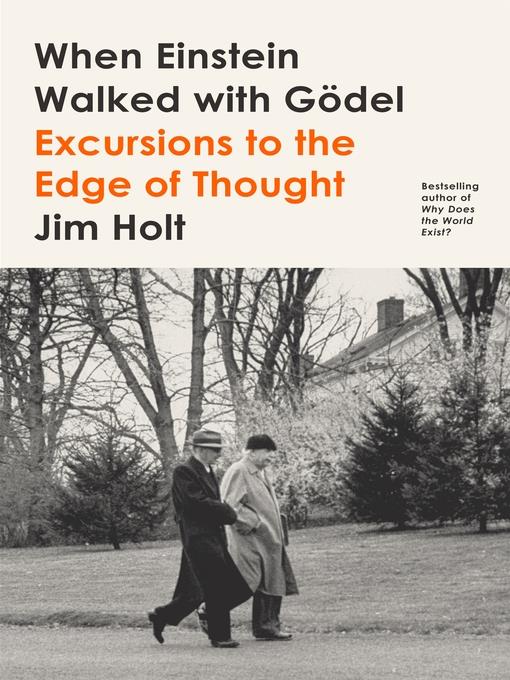
When Einstein Walked with Gödel
Excursions to the Edge of Thought
کتاب های مرتبط
- اطلاعات
- نقد و بررسی
- دیدگاه کاربران
نقد و بررسی

Starred review from February 12, 2018
Inspired by the unlikely friendship of gregarious physicist Albert Einstein (1879–1955) and gloomy logician Kurt Gödel (1906–1978), who met at Princeton’s Institute for Advanced Study in 1943, Holt (Why Does the World Exist?) fills his fantastic essay collection with stories about eccentric geniuses and groundbreaking ideas at the intersection of
science and philosophy. Two criteria link the essays: the first is “the depth, power, and sheer beauty of the ideas they convey,” and the second is what Holt calls the “human factor”—specifically that the ideas originated in the minds of people who led highly dramatic or even absurd lives. Einstein’s theory of relativity upended everyday notions about the world, in the same way that Gödel’s incompleteness theorems subverted notions about the abstract world of mathematics, and both men certainly lived dramatic lives—particularly Gödel, who starved himself to death under the delusional suspicion that everyone was trying to poison him. The men’s friendship provides a framework that leads readers to Victorian school teacher Edwin Abbott, whose satirical novella Flatland presages a look at other dimensions; computing pioneers Ada Lovelace and Alan Turing; fractal discoverer Benoit Mandelbrot; and Francis Galton, the creator of modern statistics, among others. Holt delivers this feast of wild genius, oddball thinkers, and sheer creativity in his signature accessible style of writing and playful tone. Agent: Chris Calhoun, Chris Calhoun Agency.

March 1, 2018
A collection of incisive essays that make learning about science fun.Holt (Why Does the World Exist?: An Existential Detective Story, 2012, etc.), who writes about philosophy, science, and math for the New York Times, gathers two decades of previously published essays that represent the "most thrilling (and humbling) intellectual achievements I've encountered in my life." His goal is to "enlighten" newcomers and experts alike, and he succeeds. The essays are mostly personality-driven, filled with brilliant, strange, and eccentric men and women in the sciences. Holt is an excellent synthesizer of data. In "Smarter, Happier, More Productive," he ranges among Woody Allen, Sven Birkerts, Nicholas Carr, and Henri Poincar' (not just a genius mathematician, but also a "lovely prose stylist") to delve into whether the internet "may be an enemy of creativity." As the author writes, "I've avoided the snares of the digital age. And I still can't get anything done." In "How Will the Universe End?" Holt pits a group of cosmologists, including Freeman Dyson and Michio Kaku, up against each other in a battle of end-day theories. Holt's essay on Alan Turing is particularly affecting. The man who solved the "most important logic problem of his time," the Nazi's Enigma code, was arrested for homosexuality, suffered chemical castration, and committed suicide at the age of 41. Ada Lovelace, Lord Byron's daughter, died at 36; the author describes her as the "cult goddess of cyber feminism" for her groundbreaking work in computer programming. A cluster of eclectic "Quick Studies" briefly touch on such things as the mind of a rock and the case of the puzzling Monty Hall problem. In "Doom Soon," Holt notes, "the North Star could go supernova at any moment. In fact, the dread event might already have happened."Prepare to be wined, dined, and entertained by quantum mechanics, group theory, topology, the infinitesimal, the infinitely small, and the string theory generation, among other topics.
COPYRIGHT(2018) Kirkus Reviews, ALL RIGHTS RESERVED.

July 1, 2018
Philosopher and New York Times writer Holt (Why Does the World Exist?) takes a collection of profound ideas, from theories on the infinite to how the universe will end, and presents them in a creative and thought-provoking way. He writes that the goal of the book "is to enlighten the newcomer while providing a novel twist that will please the expert." The wide range of topics includes ethics, epistemology, logic, and physics, along with Holt's insight into some of the great thinkers' personal traits and oddities. For example, the mathematician Kurt G�del thought there was a conspiracy to poison him, which, in turn, led to his death from starvation. This combination makes each chapter distinct, and each could be read on its own. VERDICT Holt's latest is as stimulating as his previous work; he has a talent for explaining complex ideas in a concise yet accessible way. Recommended for readers with an interest in the history of ideas, philosophy, mathematics, and science. [See Prepub Alert, 11/12/17.]--Scott Duimstra, Capital Area Dist. Lib., Lansing, MI
Copyright 2018 Library Journal, LLC Used with permission.

July 1, 2018
It's fantastic that Holt's philosophizing Why Does the World Exist?was a New York Timesbest seller. I expect the same here as he gets us up-to-date on the deepest scientific and mathematical problems and personalities of recent times, asking questions about infinity and why mirrors don'treverse up and down.
Copyright 2017 Library Journal, LLC Used with permission.

























دیدگاه کاربران